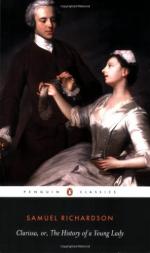’Tis a seriously sad thing, after all, that so fine a creature should have fallen into such vile and remorseless hands: for, from thy cradle, as I have heard thee own, thou ever delightedst to sport with and torment the animal, whether bird or beast, that thou lovedst, and hadst a power over.
How different is the case of this fine woman from that of any other whom thou hast seduced!—I need not mention to thee, nor insist upon the striking difference: justice, gratitude, thy interest, thy vows, all engaging thee; and thou certainly loving her, as far as thou art capable of love, above all her sex. She not to be drawn aside by art, or to be made to suffer from credulity, nor for want of wit and discernment, (that will be another cutting reflection to so fine a mind as her’s:) the contention between you only unequal, as it is between naked innocence and armed guilt. In every thing else, as thou ownest, her talents greatly superior to thine!—What a fate will her’s be, if thou art not at last overcome by thy reiterated remorses!
At first, indeed, when I was admitted into her presence,* (and till I observed her meaning air, and heard her speak,) I supposed that she had no very uncommon judgment to boast of: for I made, as I thought, but just allowances for her blossoming youth, and for that loveliness of person, and for that ease and elegance in her dress, which I imagined must have taken up half her time and study to cultivate; and yet I had been prepared by thee to entertain a very high opinion of her sense and her reading. Her choice of this gay fellow, upon such hazardous terms, (thought I,) is a confirmation that her wit wants that maturity which only years and experience can give it. Her knowledge (argued I to myself) must be all theory; and the complaisance ever consorting with an age so green and so gay, will make so inexperienced a lady at least forbear to show herself disgusted at freedoms of discourse in which those present of her own sex, and some of ours, (so learned, so well read, and so travelled,) allow themselves.
* See Vol. IV. Letter VII.
In this presumption I ran on; and having the advantage, as I conceited, of all the company but you, and being desirous to appear in her eyes a mighty clever fellow, I thought I showed away, when I said any foolish things that had more sound than sense in them; and when I made silly jests, which attracted the smiles of thy Sinclair, and the specious Partington: and that Miss Harlowe did not smile too, I thought was owing to her youth or affectation, or to a mixture of both, perhaps to a greater command of her features.—Little dreamt I, that I was incurring her contempt all the time.




